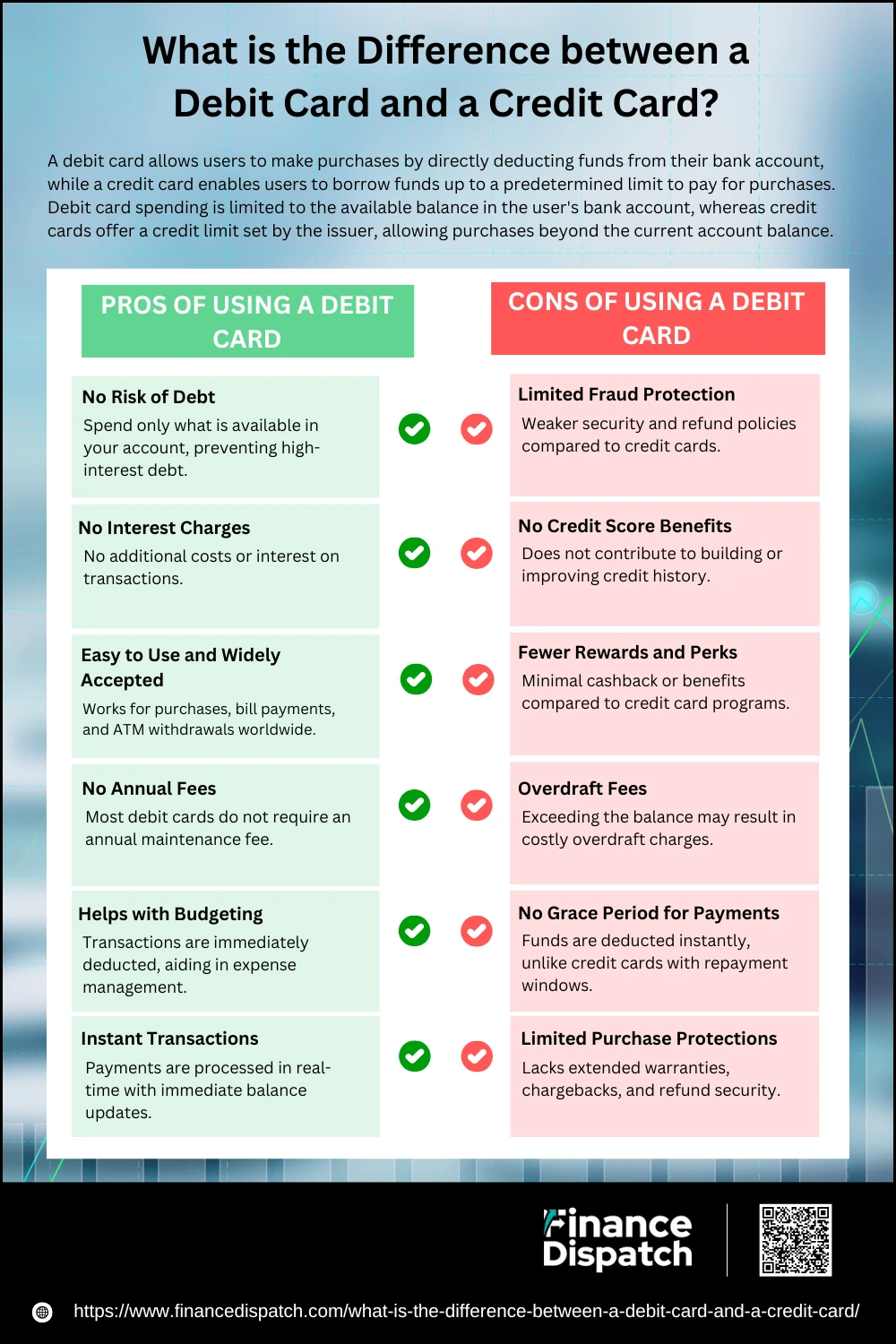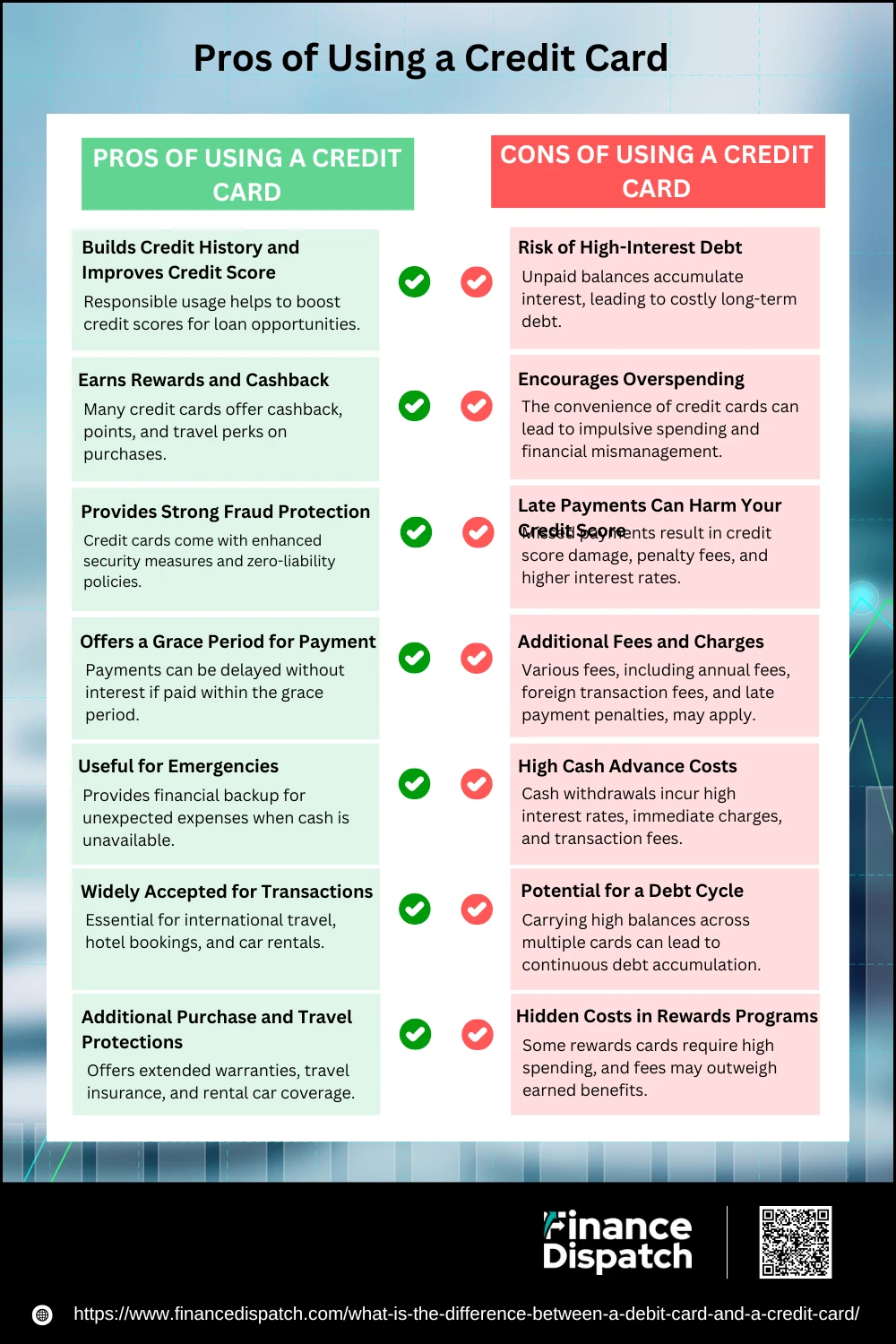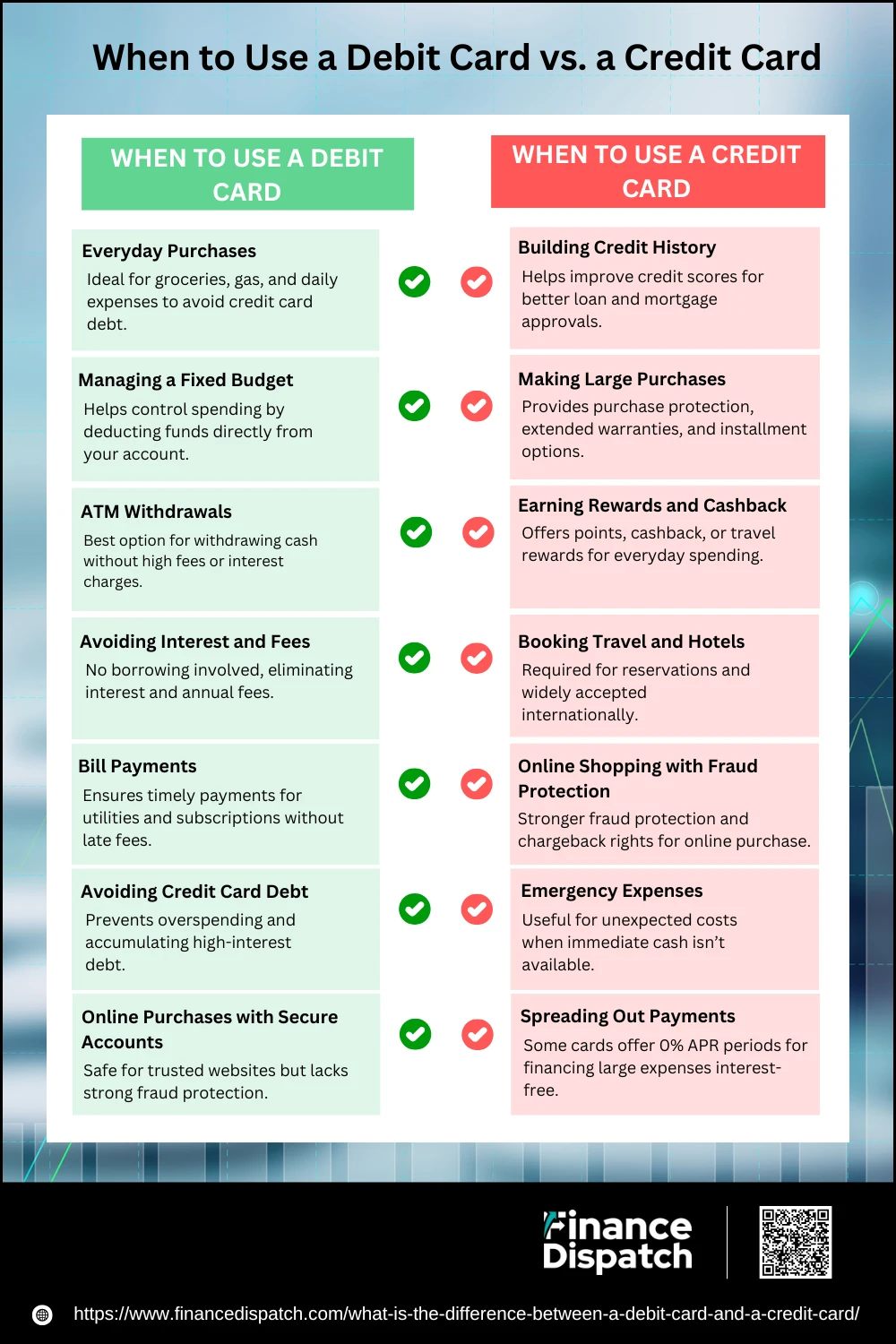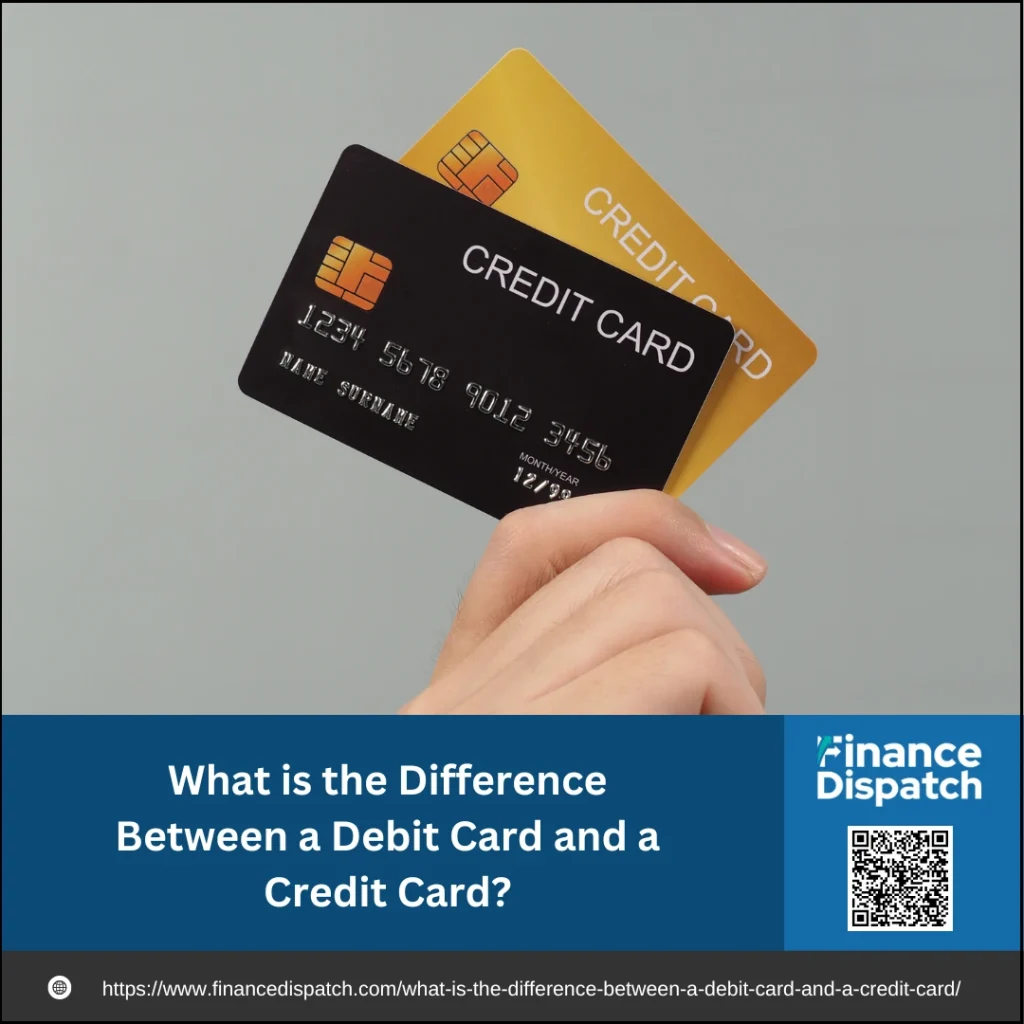In today’s digital world, debit and credit cards have become essential tools for managing personal finances. While both cards offer convenience and ease of payment, they function in fundamentally different ways. A debit card allows you to spend only the money available in your bank account, making it a straightforward way to manage expenses. In contrast, a credit card provides access to borrowed funds, enabling you to make purchases now and pay later, often with interest. Understanding the key differences between these two financial instruments can help you make informed choices about spending, budgeting, and financial security. Whether you prioritize avoiding debt or building credit, knowing when and how to use each card is crucial for effective money management.
What is a Debit Card?
A debit card is a payment card that allows you to make purchases or withdraw cash directly from your bank account. Unlike a credit card, which provides access to borrowed funds, a debit card ensures that you can only spend what you already have. When you use a debit card for a transaction, the amount is immediately deducted from your checking or savings account. This makes it a practical tool for everyday expenses, helping users manage their spending without the risk of accumulating debt. Debit cards are commonly issued by banks and financial institutions and can be used for in-store and online purchases, bill payments, and ATM withdrawals. They offer convenience and security, often featuring fraud protection and PIN-based authentication. However, unlike credit cards, debit cards typically do not help build credit history and may offer fewer rewards or perks.
What is a Credit Card?
A credit card is a financial tool that allows you to borrow money from a bank or financial institution to make purchases, pay bills, or withdraw cash. Unlike a debit card, which directly deducts funds from your bank account, a credit card provides access to a predetermined credit limit that must be repaid later. If the full balance is not paid by the due date, interest is charged on the remaining amount. Credit cards offer various benefits, including rewards programs, cashback, travel perks, and enhanced fraud protection. They also play a crucial role in building and improving credit history, as responsible use—such as making timely payments and maintaining a low credit utilization ratio—positively impacts credit scores. However, improper use, such as overspending or missing payments, can lead to high-interest debt and negatively affect financial health.
Key Differences Between Debit and Credit Cards
Although debit and credit cards look similar and are used for making payments, they operate in fundamentally different ways. A debit card is linked directly to a bank account, allowing users to spend only the money they have, while a credit card provides access to a credit line, enabling purchases to be paid off later, often with interest. Debit cards are ideal for budgeting and avoiding debt, whereas credit cards offer rewards, fraud protection, and the opportunity to build credit history. Below is a comparison table highlighting the key differences between the two.
Comparison Table: Debit Card vs. Credit Card
| Feature | Debit Card | Credit Card |
| Source of Funds | Directly from bank account | Borrowed from issuer (credit line) |
| Spending Limit | Limited to account balance | Up to the assigned credit limit |
| Credit Score Impact | No impact | Helps build or hurt credit score based on usage |
| Interest Charges | No interest charges | Charged if balance isn’t paid in full |
| Fraud Protection | Limited protection | Stronger protection and chargeback options |
| Rewards & Perks | Rare or minimal | Offers cashback, points, travel perks, and discounts |
| Overdraft/Limit Fees | Overdraft fees may apply | May have over-limit fees but offers more flexibility |
| Cash Withdrawals | Free at bank ATMs but may incur overdraft fees | Cash advances available but with high fees and interest |
| Best Used For | Everyday purchases, budgeting, avoiding debt | Large purchases, earning rewards, building credit history |
 Pros and Cons of Using a Debit Card
Pros and Cons of Using a Debit Card
A debit card is a financial tool that allows you to make purchases and withdraw cash directly from your bank account. Unlike credit cards, debit cards ensure you can only spend what you have, making them a great option for budgeting and avoiding debt. They offer convenience for everyday transactions but come with limitations such as fewer rewards and limited fraud protection. Below is a detailed look at the advantages and disadvantages of using a debit card.
Pros of Using a Debit Card
1. No Risk of Debt
One of the biggest advantages of a debit card is that you can only spend the money available in your account. Since there’s no credit line involved, there is no risk of accumulating high-interest debt, unlike credit cards. This makes it an excellent choice for individuals who prefer to manage their expenses within their means.
2. No Interest Charges
Unlike credit cards, which charge interest on unpaid balances, debit cards do not incur any interest charges. This means you don’t have to worry about paying extra fees for your purchases as long as you stay within your balance.
3. Easy to Use and Widely Accepted
Debit cards can be used for online and in-store purchases, bill payments, and ATM withdrawals. They are widely accepted by merchants and financial institutions, making them a convenient payment method both locally and internationally.
4. No Annual Fees
Most debit cards do not have annual fees, unlike many credit cards that charge a yearly maintenance fee. This makes them a cost-effective choice for everyday financial transactions. However, some premium debit cards may have additional fees for extra benefits.
5. Helps with Budgeting
Since transactions are deducted immediately from your account, it is easier to track your spending and stick to a budget. Debit cards prevent impulse spending beyond your financial capability, helping you maintain better financial discipline.
6. Instant Transactions
When using a debit card, transactions are processed instantly, and the amount is immediately deducted from your account. This allows you to see real-time changes in your bank balance, making it easier to monitor and manage your expenses.
Cons of Using a Debit Card
1. Limited Fraud Protection
One of the biggest downsides of using a debit card is the risk of fraud. If someone gains access to your card details, they can directly withdraw money from your account. Unlike credit cards, which have strong fraud protection and chargeback rights, debit card fraud protection is weaker. If unauthorized transactions occur, it may take time for banks to investigate and refund your money.
2. No Credit Score Benefits
Since debit cards do not involve borrowing money, they do not contribute to your credit history or credit score. This means that if you are looking to build or improve your credit profile for future loans or mortgages, using a debit card will not help. In contrast, responsible credit card usage can boost your credit score over time.
3. Fewer Rewards and Perks
Unlike credit cards that offer cashback, travel rewards, and loyalty points, debit cards typically do not provide such benefits. While some banks may offer minimal cashback on debit card transactions, the rewards are not as lucrative as credit card programs.
4. Overdraft Fees
If you attempt to make a purchase that exceeds your account balance, your transaction may be declined, or worse, you may be charged an overdraft fee. Some banks offer overdraft protection, but this can come with additional costs, making it an expensive feature if not managed properly.
5. No Grace Period for Payments
With a credit card, you get a grace period—a window of time (usually 21–30 days) to pay your balance without interest. However, with a debit card, the money is withdrawn instantly, leaving you no time to delay payments or manage short-term cash flow issues.
6. Limited Purchase Protections
Many credit cards come with extended warranties, purchase protection, and chargeback options, which help if you receive a defective product or need to dispute a charge. Debit cards, on the other hand, offer minimal or no such protection, making it harder to get refunds or recover lost money.
 Pros and Cons of Using a Credit Card
Pros and Cons of Using a Credit Card
A credit card is a financial tool that allows you to borrow money from a bank or financial institution to make purchases, pay bills, or withdraw cash. Unlike debit cards, which deduct funds directly from your bank account, credit cards provide access to a credit line that must be repaid later. When used responsibly, credit cards can offer numerous benefits, including rewards programs, fraud protection, and credit-building opportunities. However, mismanagement can lead to financial pitfalls such as high-interest debt, overspending, and credit score damage. Below, we explore the key advantages and disadvantages of using a credit card.
Pros of Using a Credit Card
1. Builds Credit History and Improves Credit Score
Using a credit card responsibly can help establish and improve your credit history, which is crucial for securing loans, mortgages, and favorable interest rates. Credit bureaus track your payment history, credit utilization, and account longevity, all of which impact your credit score. Making timely payments and keeping balances low can positively influence your creditworthiness.
2. Earns Rewards and Cashback
Many credit cards offer rewards programs, allowing cardholders to earn points, cashback, or airline miles on their purchases. Depending on the card type, you may benefit from flat-rate cashback, category-based rewards (e.g., travel, dining, groceries), or exclusive perks such as hotel discounts and gift cards.
3. Provides Strong Fraud Protection
Credit cards offer enhanced security features compared to debit cards. Under the Fair Credit Billing Act, credit card users are typically liable for a maximum of $50 in unauthorized transactions, and many issuers provide zero-liability protection, meaning cardholders are not responsible for fraudulent purchases if reported promptly.
4. Offers a Grace Period for Payments
Unlike debit cards, which deduct funds immediately, credit cards provide a grace period—usually 21 to 30 days—before interest is charged. This allows cardholders to manage their cash flow efficiently and pay off balances without incurring additional costs.
5. Useful for Emergencies
A credit card can serve as a financial safety net in case of unexpected expenses, such as medical bills, car repairs, or travel emergencies. It allows you to cover urgent costs even if you don’t have sufficient cash on hand.
6. Widely Accepted for Transactions
Credit cards are accepted worldwide, making them essential for international travel. They are also required for certain transactions, such as hotel bookings, car rentals, and airline reservations, where a security deposit may be necessary.
7. Additional Purchase and Travel Protections
Many credit cards provide extended warranties, price protection, and travel insurance for purchases made using the card. Some premium credit cards also offer rental car insurance, lost luggage reimbursement, and trip cancellation coverage, adding an extra layer of security.
8. Allows for Flexible Payment Options
Cardholders can choose to pay their balance in full to avoid interest or make minimum payments when cash flow is tight. Some credit cards also offer installment plans or 0% APR introductory offers, which help in managing large purchases.
Cons of Using a Credit Card
1. Risk of High-Interest Debt
If a balance is not paid in full by the due date, interest charges accumulate, often at high annual percentage rates (APR). Carrying a balance from month to month can quickly lead to substantial debt.
2. Encourages Overspending
The convenience of using credit cards can lead to impulsive spending beyond one’s financial means. Since there is no immediate deduction from a bank account, it’s easy to lose track of expenses and accumulate debt unknowingly.
3. Late Payments Can Harm Your Credit Score
Missing credit card payments can significantly lower your credit score, making it harder to qualify for loans or favorable interest rates. Late payments can also result in penalty fees and increased APRs.
4. Additional Fees and Charges
Credit cards come with various fees, including:
- Annual fees (for premium cards)
- Late payment fees
- Foreign transaction fees (for international purchases)
- Cash advance fees (for withdrawing cash using a credit card)
5. High Cash Advance Costs
Withdrawing cash using a credit card (cash advance) is expensive, as it incurs:
- High interest rates (often higher than standard purchase rates)
- Immediate interest charges (no grace period)
- Transaction fees
6. Potential for a Debt Cycle
Without careful management, credit card debt can spiral out of control, leading to long-term financial strain. Carrying multiple credit cards with high balances can make it difficult to keep up with payments, trapping users in a cycle of minimum payments and mounting interest charges.
7. Hidden Costs in Rewards Programs
While rewards programs can be beneficial, some cards require high spending to maximize rewards. If a cardholder spends beyond their means just to earn points, the interest and fees may outweigh the rewards earned.
 When to Use a Debit Card vs. a Credit Card?
When to Use a Debit Card vs. a Credit Card?
Both debit cards and credit cards offer convenience and flexibility, but they serve different purposes. A debit card is directly linked to your bank account, making it a great choice for everyday expenses and controlled spending. On the other hand, a credit card allows you to borrow money up to a certain limit, making it useful for large purchases, emergencies, and earning rewards. Knowing when to use each card can help you maximize benefits while avoiding unnecessary debt or fees. Below is a detailed breakdown of when it’s best to use a debit card versus a credit card.
When to Use a Debit Card
1. Everyday Purchases
For regular expenses like groceries, gas, and coffee shop visits, a debit card is ideal because it ensures that you are only spending money that you already have. This helps in avoiding credit card debt and unnecessary interest charges.
2. Managing a Fixed Budget
If you are on a strict budget or trying to control your spending, a debit card helps you stick to your financial limits. Since the transaction is immediately deducted from your account, it prevents overspending and encourages better money management.
3. ATM Withdrawals
If you need cash, using a debit card at your bank’s ATM is usually the best option. Withdrawing cash using a credit card results in high fees and interest charges, making debit the smarter choice for accessing cash.
4. Avoiding Interest and Fees
Since a debit card does not involve borrowing money, you do not have to worry about paying interest on purchases. Additionally, debit cards typically do not have annual fees, making them a cost-effective payment option.
5. Bill Payments
Recurring expenses like utility bills, phone bills, and subscriptions can be safely paid with a debit card to ensure the money is deducted immediately. This prevents the risk of missing a payment and getting charged late fees, as might happen with a credit card.
6. Avoiding Credit Card Debt
If you have difficulty managing credit card payments, it’s safer to stick to a debit card. With a debit card, you can only spend what you have, reducing the temptation to overspend and accumulate debt.
7. Online Purchases with Secure Accounts
For online transactions on trusted websites, a debit card is a simple and effective payment method. However, for high-risk purchases or transactions on unfamiliar websites, a credit card is preferable due to its better fraud protection.
When to Use a Credit Card
1. Building Credit History
A credit card helps you build and maintain a strong credit score, which is essential for securing loans, mortgages, and better interest rates. Regular, responsible credit card usage—such as making timely payments and keeping balances low—can improve your credit profile over time.
2. Making Large Purchases
For big-ticket items like electronics, furniture, or appliances, a credit card offers purchase protection, extended warranties, and chargeback rights. Some credit cards also allow you to break up large payments into installments, making it easier to manage expenses.
3. Earning Rewards and Cashback
Credit cards often come with rewards programs, offering cashback, airline miles, or points on purchases. If used wisely and paid off in full each month, a credit card can help you earn valuable rewards while covering everyday expenses.
4. Booking Travel and Hotels
Many hotels, airlines, and car rental companies require a credit card for reservations and deposits. Credit cards are also widely accepted internationally, making them a preferred option for travel. Additionally, some credit cards offer travel insurance and trip cancellation protection.
5. Online Shopping with Fraud Protection
If you’re making purchases online, a credit card is the safer option because it provides better fraud protection. In case of unauthorized transactions or issues with a purchase, you can dispute charges and get a refund much more easily than with a debit card.
6. Emergency Expenses
A credit card can serve as a financial safety net for unexpected expenses like medical bills, urgent repairs, or last-minute travel. In emergencies where you don’t have immediate access to cash, a credit card provides temporary financial relief.
7. Spreading Out Payments
Some credit cards offer 0% APR introductory periods, allowing you to finance large purchases without paying interest for a limited time. This can be useful when you need to spread out payments on expensive items.
How Debit and Credit Cards Affect Your Financial Health
Both debit and credit cards play a significant role in shaping your financial health, but they impact your finances in different ways. A debit card helps you manage spending by ensuring that you only use the money available in your bank account, making it a great tool for budgeting and avoiding debt. However, it does not contribute to building your credit score, which is an essential factor for securing loans and financial opportunities. On the other hand, a credit card can help establish and improve your credit history, provided it is used responsibly. Timely payments and low credit utilization can boost your credit score, making it easier to qualify for mortgages, auto loans, and better interest rates. However, mismanaging a credit card by carrying high balances, missing payments, or maxing out limits can lead to high-interest debt and negatively impact your creditworthiness. Understanding the effects of both cards on your financial well-being allows you to make informed decisions, ensuring that your spending habits align with your long-term financial goals.
Conclusion
Understanding the differences between debit and credit cards is essential for making smart financial decisions. Debit cards help with budget control, ensuring you only spend what you have, while credit cards offer financial flexibility, rewards, and the opportunity to build credit. However, responsible usage is key—using a debit card prevents debt but does not contribute to your credit history, whereas a credit card can enhance your financial profile but carries the risk of high-interest debt if mismanaged. By strategically using both cards based on your financial needs, you can maximize benefits, protect your finances, and maintain long-term financial stability.



